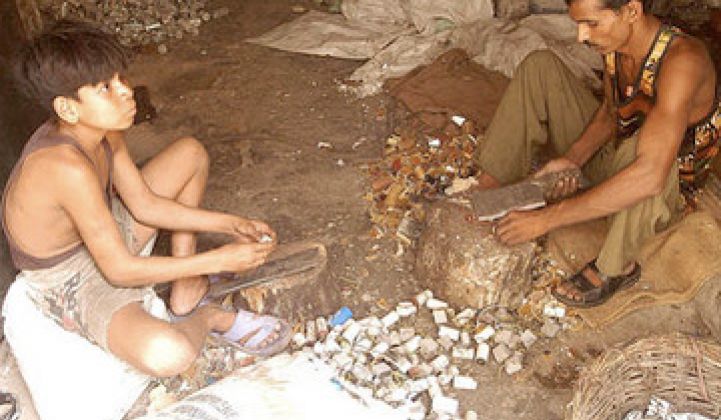SVTC is the Silicon Valley Toxics Coalition. The organization got its start as an industry watchdog looking at the computer and electronics industry's toxics profile. Now they're working on minimizing the environmental risk of solar panels and solar manufacturing.
It's hard to be against recycling.
But SVTC is aiming for mandatory recycling of solar panels.
So far, many solar manufacturers have tended to do the right thing when it comes to recycling solar panels. First Solar and Abound Solar, manufacturers of cadmium telluride thin-film solar panels, already have take-back programs. First Solar has a long-term, bankruptcy-proof, pre-paid trust to cover take-back and recycling of panels. The same might not be true for the many Chinese solar manufacturers, although Trina Solar and Yingli Solar scored well on SVTC's solar scorecard.
Does the solar industry really need a mandate for recycling panels?
The answer is yes, according to Sheila Davis, Executive Director at SVTC, who spoke at Morrison Foster (also known as MoFo) in Palo Alto, California this morning.
Davis said, "We believe in mandatory recycling in electronics." She said that if everyone has to recycle, it creates a level playing field, adding, "If people are committed to recycling, then people will design for recycling."
She also spoke of the need to harmonize the recycling laws in 50 states with 50 different laws, reminiscent of the solar permitting issue.
Dustin Mulvaney, the technical advisor for SVTC and a Postdoctoral Fellow at the University of California, Berkeley, spoke about the necessity of preventing an e-waste crisis from solar panels, citing the risks of releasing tellurium and indium into the environment, as well as the elements' rarity. He listed the PV materials that can be recycled as glass, silicon wafers, silver, indium, tin, moly, nickel, zinc, copper, aluminum, zinc, plastics, CdTe filter cake, and CIGS filter cake.
Davis said, "We have this advantage that we're not reactive in this case." Most recycling laws are enacted when there's a marooned garbage barge in the New York harbor or ten-year-olds dying from breaking up toxic electronics with hammers. She saw this as an opportunity to get ahead of the problem.
Davis suggested that the following steps need to be implemented in solar panel recycling.
- Toxics reduction and elimination (SVTC realizes that this is the most challenging component)
- Green chemical principles
- Design for environmental, design for recycling
- Life cycle analysis
- Perform alternative assessment
- Test all new materials
SVTC also works on a solar scorecard to rank solar manufacturers by extended producer responsibility (EPR) and takeback, supply chain monitoring and green jobs, chemical use and life-cycle analysis as well as disclosure. Some of the higher scoring solar firms on the SVTC solar scorecard are SolarWorld, First Solar, REC, Trina Solar, SunPower, and Yingli Solar. Many were ranked as zero, but that's simply because they did not respond to the survey. First Solar does not disclose how much on a cost-per-watt basis is devoted to the take-back and recycling program.



